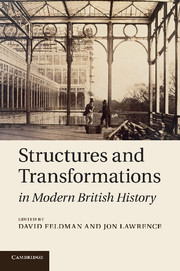Book contents
- Frontmatter
- Contents
- List of figures
- Notes on contributors
- Introduction: structures and transformations in British historiography
- 1 Coping with rapid population growth: how England fared in the century preceding the Great Exhibition of 1851
- 2 The ‘urban renaissance’ and the mob: rethinking civic improvement over the long eighteenth century
- 3 Forms of ‘government growth’, 1780–1830
- 4 Family formations: Anglo India and the familial proto-state
- 5 The commons, enclosure and radical histories
- 6 Engels and the city: the philosophy and practice of urban hypocrisy
- 7 The decline of institutional reform in nineteenth-century Britain
- 8 British women and cultures of internationalism, c.1815–1914
- 9 Psychoanalysis, history and national culture
- 10 Labour and the politics of class, 1900–1940
- 11 The dialectics of liberation: the old left, the new left and the counter-culture
- 12 Why the English like turbans: multicultural politics in British history
- Index
11 - The dialectics of liberation: the old left, the new left and the counter-culture
Published online by Cambridge University Press: 04 February 2011
- Frontmatter
- Contents
- List of figures
- Notes on contributors
- Introduction: structures and transformations in British historiography
- 1 Coping with rapid population growth: how England fared in the century preceding the Great Exhibition of 1851
- 2 The ‘urban renaissance’ and the mob: rethinking civic improvement over the long eighteenth century
- 3 Forms of ‘government growth’, 1780–1830
- 4 Family formations: Anglo India and the familial proto-state
- 5 The commons, enclosure and radical histories
- 6 Engels and the city: the philosophy and practice of urban hypocrisy
- 7 The decline of institutional reform in nineteenth-century Britain
- 8 British women and cultures of internationalism, c.1815–1914
- 9 Psychoanalysis, history and national culture
- 10 Labour and the politics of class, 1900–1940
- 11 The dialectics of liberation: the old left, the new left and the counter-culture
- 12 Why the English like turbans: multicultural politics in British history
- Index
Summary
Our play's chief aim has been to take to bits
great propositions and their opposites
see how they work then let them fight it out …
Peter Weiss, Marat/Sade (1965)In applying this pronouncement from Marat/Sade to the historical context of its first English-language production in London in the mid-1960s, the first ‘great proposition’ to consider is that of the old left. This is understood here as referring to a range of views, shaped by the Bolshevik revolution and the inter-war economic crisis, broadly in favour of organised labour pressing for a centrally planned economy and state-administered social provision. There may have been disagreements about how quickly this could be achieved, the role of vanguards and mass parties in bringing it about, and the degree of egalitarianism in the outcome. However, all those who subscribed to this proposition stressed the same notions of the main agent and the main direction of change, rooted in nineteenth-century materialism of either the Marxist or the Revisionist variety.
The parliamentary old left was widely seen as confronting a serious crisis of social change and political realignment as a result of the affluence associated with the long period of economic growth after 1945. Full employment, a shift from manual to non-manual occupations, new residential patterns and increasing access to consumer goods were thought to be undermining older habits and loyalties, contributing to the Labour Party's defeat in three successive general elections during the 1950s.
Information
- Type
- Chapter
- Information
- Structures and Transformations in Modern British History , pp. 261 - 280Publisher: Cambridge University PressPrint publication year: 2011
Accessibility standard: Unknown
Why this information is here
This section outlines the accessibility features of this content - including support for screen readers, full keyboard navigation and high-contrast display options. This may not be relevant for you.Accessibility Information
- 1
- Cited by
